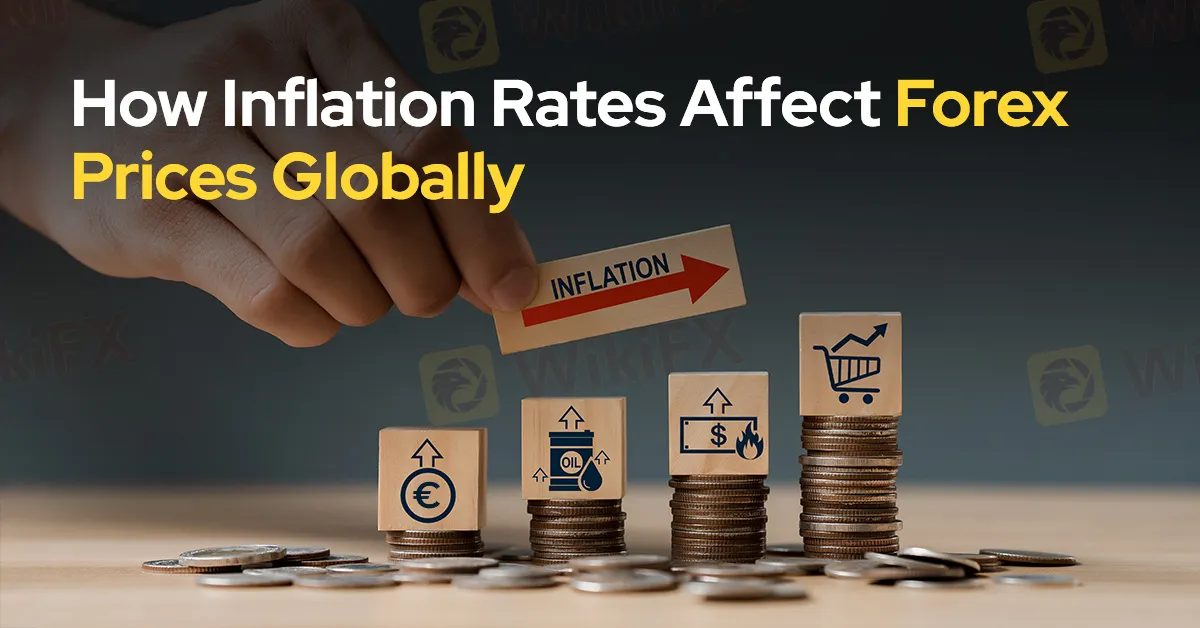简体中文
繁體中文
English
Pусский
日本語
ภาษาไทย
Tiếng Việt
Bahasa Indonesia
Español
हिन्दी
Filippiiniläinen
Français
Deutsch
Português
Türkçe
한국어
العربية
How Inflation Rates Affect Forex Prices Globally
Abstract: In this article, we’ll explore how inflation affects forex prices globally, the relationship between inflation and currency value, and why traders monitor inflation closely.

Introduction
Inflation influences the purchasing power of a currency and reflects economic health. When inflation rates fluctuate, central banks and governments take action to stabilize their economies, and these actions significantly impact the forex market. In this article, well explore how inflation affects forex prices globally, the relationship between inflation and currency value, and why traders monitor inflation closely.
Understanding Inflation and Its Impact on Currency Value
Inflation occurs when there is a sustained increase in the general price level of goods and services in an economy. When inflation is high, it erodes the purchasing power of money—meaning a unit of currency buys fewer goods than before. Conversely, low or stable inflation tends to indicate a healthy economy and stable purchasing power.
Relationship Between Inflation and Currency Value:
- High Inflation: When a country experiences high inflation, its currency typically depreciates because the purchasing power weakens, making it less attractive to investors.
- Low Inflation: Conversely, low inflation or deflation can strengthen a currency as it retains more purchasing power relative to other currencies.
Global Inflation Trends and Their Impact on Forex Prices
Since inflation rates vary widely across countries, they create unique currency interactions in the forex market. There are three factors that how global inflation trends affect currency prices.
- High Inflation in Emerging Markets
Emerging markets often experience higher inflation rates due to faster economic growth and less stable economic structures. Currencies in these markets tend to be more volatile. For example, the Turkish lira (TRY) and the Argentine peso (ARS) have seen significant devaluation against stronger currencies like the USD due to high inflation rates.
- Inflation Divergence Between Developed Economies
Inflation divergence between developed economies—like the U.S., Eurozone, and Japan—can impact the balance of forex prices globally. For example, if the U.S. faces higher inflation than Japan, the USD/JPY exchange rate may see downward pressure on the USD, as investors seek to invest in countries with more stable inflation.
- Commodity-Driven Inflation and Commodity Currencies
Countries like Canada and Australia, known for their commodity-driven economies, often experience currency shifts when inflation is influenced by commodity prices. High demand for oil, gold, or other natural resources can lead to inflationary pressures in these countries, causing the Canadian dollar (CAD) and Australian dollar (AUD) to fluctuate in response to global commodity prices.
Key Risks Associated with Inflation and Forex Trading:
- Exchange Rate Volatility: Sudden inflation spikes can lead to abrupt shifts in forex prices, increasing risks for traders with open positions. This risk is more pronounced in emerging markets with high inflation.
- Carry Trades Risks: Traders engaged in carry trades—borrowing in low-interest-rate currencies to invest in higher-yielding currencies—face potential losses if inflation leads to abrupt currency depreciation.
- Interest Rate Speculation: High inflation often leads to speculation around central bank interest rate changes, driving currency volatility as traders react to potential policy shifts.
Conclusion
Inflation is a powerful economic force that shapes forex markets globally. It affects currency value, central bank actions, and ultimately, forex trading strategies. For traders, understanding the link between inflation and forex prices provides insights into potential currency movements, enabling better-informed trading decisions. As inflation dynamics continue to shift in response to global events, traders who keep an eye on inflation data will be better equipped to navigate the complexities of the forex market.

Disclaimer:
The views in this article only represent the author's personal views, and do not constitute investment advice on this platform. This platform does not guarantee the accuracy, completeness and timeliness of the information in the article, and will not be liable for any loss caused by the use of or reliance on the information in the article.
Read more

When High Returns Go Wrong: How a Finance Manager Lost RM364,000
A finance manager in Malaysia lost more than RM364,000 after falling victim to an online investment scam that promised quick and high returns.

Experienced Forex Traders Usually Do This Before Making a Lot of Money
If you’ve ever wondered what sets successful forex traders apart from the rest, one thing is clear: experience teaches them never to rush into a trading relationship without doing their homework. Whether you're a seasoned trader or just starting out, the secret to long-term success in forex trading is a robust, well-informed decision when choosing a broker.

Why Is Crypto Booming in Online Trading Compared to Forex?
Know why cryptocurrencies are booming in online trading, offering forex traders new opportunities, higher volatility, and the potential for greater returns.

What Can Forex Traders Learn from Ne Zha?
The animated blockbuster Ne Zha: Birth of the Demon Child tells the story of Ne Zha’s journey to defy fate and take control of his own destiny. Beyond being an inspiring tale filled with action and character growth, the film conveys profound life lessons - many of which resonate deeply with the world of forex trading.
WikiFX Broker
Latest News
Enlighten Securities Penalized $5 Million as SFC Uncovers Risk Control Failures
Why Are Financial Firms Adopting Stablecoins to Enhance Services and Stability?
Experienced Forex Traders Usually Do This Before Making a Lot of Money
Octa vs XM:Face-Off: A Detailed Comparison
When High Returns Go Wrong: How a Finance Manager Lost RM364,000
Bridging Trust, Exploring Best—WikiEXPO Hong Kong 2025 Wraps Up Spectacularly
Unlocking the Power of Algo Trading: Benefits and Limitation
Rise of Fake Trading Apps & Their Impact on Investors
Crypto-to-Cash Transfers Now Available for UK and Europe
U.S. and Japan Interest Rates Hit Recent Highs – Watch Out for Short Sellers
Currency Calculator







